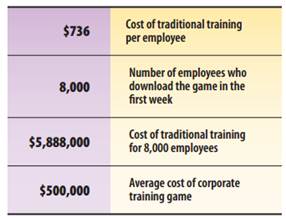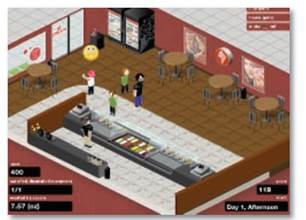Reference no: EM131485566
Question: On-the-Job Video Gaming
Laura Holshouser's favorite video games include Halo, Tetris, and an online training game developed by her employer. A training game? That's right. The 24-year-old graduate student, who manages a Cold Stone Creamery ice-cream store in Riverside, Calif., stumbled across the game on the corporate Web site in October. It teaches portion control and customer service in a cartoon-like simulation of a Cold Stone store. Players scoop cones against the clock and try to avoid serving too much ice cream. The company says more than 8,000 employees, or about 30% of the total, voluntarily downloaded the game in the first week. . . . The military has used video games as a training tool since the 1980s. Now the practice is catching on with companies, too. . . . Corporate trainers are betting that games' interactivity and fun will hook young, media-savvy employees like Holshouser and help them grasp and retain sales, technical, and management skills.


Companies like video games because they are costeffective. Why pay for someone to fly to a central training campus when you can just plunk them down in front of a computer? Even better, employees often play the games at home on their own time. Games are especially well-suited to training technicians. Last year, Cisco rolled out six new training games-some of them designed to teach technicians how to build a computer network. It's hard to imagine a drier subject. Not so in the virtual world. In one Cisco game, players must put the network together on Mars. In a sandstorm Sounds suspiciously like fun.
1. Summarizing How has on-the-job video gaming made workers and companies more efficient?
2. Analyzing How do companies make video training games appealing for their employees?